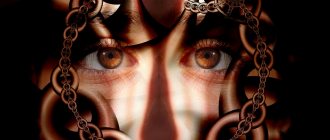Narrated by Andrey Arkadyevich Shmilovich
, Doctor of Medical Sciences, doctor of the highest category, head of the Department of Psychiatry and Medical Psychology, Russian National Research Medical University named after. N.I. Pirogova, chief physician of the Alter clinic:
Today we will talk about mental disorders that are most common in involutionary age. We need to start with the fact that involutionary age, like any other age period, is revised over time.
Today, the World Health Organization has moved this age a little forward, and this is completely logical, since human life expectancy is increasing, age periods are changing, and today we can call this age the period from 50 to 65 years.
What is involution?
Why is this age called involutionary? What is involution? Directly translated into Russian, this word means “fading” - we are talking about a decrease in general activity: mental, physical with the gradual extinction of functions such as memory, pace of thinking, various types of attention, and other cognitive functions.
At the same time, that same sedateness appears, characteristic of mature people who have achieved certain successes in their lives, a certain slowness, thoughtfulness, which creates the image of a person wise from life experience.
This age is characterized by the appearance of traditional social stress
Firstly, the family environment. Having reached this age, people are faced with the passing of their parents, who are approximately 70–80 years old. This is not just death, very often this death can be very difficult and painful, since parents sometimes need serious care. They become quite capricious and demanding, often lose their memory, and behave like children. This begins to irritate, it takes up a huge amount of energy and time, which is so lacking for people who have reached involutionary age. This stress certainly takes its toll.
Secondly, the children of those who have achieved involution, by this time, already married, have finally separated from their native nest. They themselves form a family nest, give birth to two or three children, and build some kind of their own life. Of course, sometimes it hurts to lose such close and romantic contact with your children that you had before this time.
And here, sons-in-law and daughters-in-law often act as persons occupying an oppositional role. And accordingly, the mother-in-law, father-in-law, father-in-law and mother-in-law begin to enter into conflicting relationships with them, and quite serious mental trauma appears on both sides. This also cannot but affect the mental state.
Involutional psychosis - senile delirium, paranoid and melancholy in one funnel
A fairly large percentage of older people are susceptible to such an unpleasant disease as involutional presenile psychosis.
This is a mental illness that is characterized by such deviations as the constant presence of depressive states, the appearance of paranoid thoughts, delusions of harm, and hallucinations.
These symptoms can develop either separately from each other or simultaneously. Typically, the depth and nature of symptoms directly depends on the person’s age. For example, among people under 65 years of age suffering from mental illness, approximately 5% suffer from involutional psychosis. With increasing age, senile psychosis occurs more and more often, reaching 10%.
The disease develops gradually, quite slowly, but in some cases it can appear quite unexpectedly. As a rule, this is accompanied by strong emotional shocks, mental trauma, or some other somatic condition experienced by the individual.
Initially, everything may simply look like excessive concern for one’s health or the health of loved ones, and worries develop for a variety of reasons. Over time, seemingly insignificant symptoms develop into full-blown depression, delusions and paranoia.
The disease is more common among women.
Differences from senile psychosis
Do not confuse involutional psychosis with senile psychosis. In the first case, the main causes of the disease are mainly internal factors:
- character type;
- suspiciousness;
- anxiety;
- serious mental shocks for various reasons.
Senile psychosis (or, as it is also called, senile psychosis) develops for completely different reasons: it may be physical inactivity, disruption of the functioning of the sensory organs, poor poor-quality nutrition, and sleep problems.
In addition, senile psychosis can be quite irregular - at one time its symptoms increase significantly, and at another almost completely disappear. If we talk about involutional psychosis, then it is characterized by a more uniform, stable development.
Factors provocateurs
Despite the fact that doctors and specialists identify some important factors that are believed to be capable of triggering the development of involutional psychosis, in fact, the etiology of this disease is virtually unknown.
Usually, doctors can only detect the presence of a disease based on its specific symptoms and take therapeutic measures, but it is very, very difficult to predict the development of disorders or prevent it in advance.
Possible triggers include:
- Bad heredity . If someone in the family has experienced similar deviations, then the likelihood that the episode will repeat increases.
- Being in a difficult, tense emotional environment for a long time , this can include family scandals, a difficult work rhythm, etc.
- Severe nervous and mental shocks as a result of any traumatic events. Again, the personality of the individual himself and his heredity are also very important here. For one person, an event will not cause a special reaction, but for another it can become a trigger for the development of mental illness.
Who is at risk
Presenile and senile psychoses pose the greatest danger to older people, and especially to women. Cases of the disease have been reported in people over 45 years of age.
Most often, a complex of disorders is observed at the age of 50-60 years. If the patient’s life involves constant nervous shock, stress and depression, and relationships with family and loved ones leave much to be desired, then the likelihood of mental illness increases many times over.
Complex clinical picture
Presenile psychosis is characterized by the following main signs and symptoms:
- Old people experience hallucinations, illusions and auditory deceptions . This is manifested by the fact that the patient claims to hear the whispers of people who are preparing a vile conspiracy against him, noise behind the wall, which is not actually observed, the sound of footsteps even in an empty apartment.
- Complaints about non-existent, fictitious problems . For example, a patient may claim that his stomach or liver hurts because his food was poisoned by ill-wishers who are persecuting him. The so-called delusion of damage develops.
- Senile psychoses are characterized by a sharp change in appearance . If suddenly an elderly person completely unexpectedly and quickly becomes decrepit and loses a lot of weight, then this most likely indicates serious problems in his mental state.
Article on the topic: The occipital lobe and its functions
Also, presenile mental disorders are characterized by symptoms of Kraepelin's disease associated with the presence of an anxious depressive state. This is most often expressed as:
- lack of normal sleep, inability to fall asleep on time;
- muttering incoherently to oneself, slurring words and sentences that are very difficult or impossible to understand;
- Outwardly, an elderly patient may show severe confusion, an inability to concentrate his attention on certain objects, people, or conversation.
In medicine, it is customary to distinguish three main forms of presenile psychosis:
- involutional paranoid;
- delirium of damage
- involutional melancholy.
Let's look at their features and main differences in more detail.
Paranoid manifestations and delusions of harm
Involutional paranoid is characterized by the fact that the patient is prone to various delusional disorders in which he views his relationships with his own loved ones, friends, family members, and any acquaintances in a completely perverted, incorrect, and often very aggressive way. An old person may develop persistent obsessive delusions that take over his thoughts and prevent him from concentrating on anything else.
Very often, patients with involutional paranoid develop the so-called delusion of harm - it seems to them that the people around them, in particular family members, want to cause them some harm, steal, injure them, and the like. Since the social circle of such patients is usually very narrow and limited to the same family, their fears to a stranger may sometimes even seem convincing. In reality, there is a delusion of damage.
Features of melancholy
Involutional melancholia can be divided into two subcategories: malignant (Kraepelin's disease) and senile. The symptoms of both increase rather slowly over a long period of time.
Of course, any psychological trauma can significantly accelerate their development. Senile involutional melancholy is accompanied by a constant feeling of anxiety: the patient is depressed, he expresses unreasonable worries about the health of both himself and his loved ones, he may often worry about his material well-being, for some reason believing that he is in danger of trouble.
Very often, a person’s negative mood intensifies closer to the dark. Even the slightest changes in the environment, social circle or home (for example, the apartment was cleaned) can cause attacks of anxious depression and anxiety.
It is anxious depression that is the main characteristic of presenile psychosis.
Kraepelin's disease (malignant involutional melancholia) is characterized by such an important difference as the presence of constant anxious arousal.
It is very difficult for the patient to concentrate, speak coherently and clearly, and fall asleep normally. Melancholy occurs in people after 65 years of age, when brain neurons significantly reduce their activity. It is during this period that the individual is most susceptible to a variety of mental disorders.
How can one suspect from the outside?
Many symptoms of mental illness can only be identified by a doctor; in order for an ordinary person, for example, a relative of a patient, to understand that his relative has involutional psychosis, he needs to know the characteristic signs of this deviation:
- whether the alleged patient has delusions of persecution and harm, unreasonable constant anxiety and distrust of others;
- it is necessary to assess whether the patient can speak clearly, adequately, in accordance with the topic of the conversation;
- it is necessary to assess whether a person can fall asleep normally, whether any disturbing thoughts that have no basis disturb him at night.
Article on the topic: Asparkam - instructions for use
These manifestations will help you understand that a person is developing a mental illness and promptly consult a doctor.
If suspicious symptoms appear, you should definitely consult a doctor for a diagnosis. This is the only way to clearly confirm or refute your suspicions.
The doctor will examine the patient and ask him a series of leading questions that will help him clearly understand what problem he is dealing with.
Therapy methods
One of the main principles of treatment of involutional psychosis is the principle of “do no harm.” It is necessary to find such an approach to treatment in order to exclude further aggravation and development of disorders, and not give rise to even greater mistrust on the part of the patient.
If you prevent the development of a chronic form of the disease, then this can already be considered, in some way, a significant victory against psychosis.
Medications play a major role in the treatment process. The number of items and dosages are strictly limited, since we usually have to deal with older people who simply cannot tolerate a large amount of medications taken.
Antidepressants Pyrazidol, Zoloft, Tianeptine, Ludoimil, Anafranil and many others are actively used. The main requirement for medications is that they must have a minimum of possible side effects.
Neuroleptics with sedative effects are often prescribed. They help suppress feelings of anxiety, relieve excitement of the nervous system, and fall asleep normally.
A sedative is best for people with Kraepelin's disease. As for involutional melancholia, the main role is played by neuroleptics with a psychotic effect. They help to cope with delusions and overcome various hallucinations, including auditory ones.
It is worth mentioning separately the importance of friendly conversations and psychotherapy sessions. This measure helps the patient become calmer, more balanced, and at least get out of an anxious state.
Consequences and possible prevention
Over time, a person increasingly loses touch with the real world, lives with imaginary and far-fetched anxieties, can significantly ruin relationships with those around him and those close to him, and become a very unpleasant and strong burden for them.
Reason gradually leaves such a person and he ceases to adequately perceive the world around him, which may ultimately result in complete incapacity.
With adequate supportive treatment, in most cases the person will be able to live a normal normal life, but it should always be treated with extreme caution. No quarrels or worries should affect him. The patient should be enveloped in an exclusively positive atmosphere and unobtrusive care.
As for the issue of disease prevention, it comes down to attempts to delay the process of aging of the body and the destruction of the nervous system.
This is achieved using quite standard methods: proper moderate nutrition, physical activity and exercise in a reasonable amount, constant mental work, which helps brain neurons to be active and build new connections, thereby significantly slowing down the degradation of the brain.
It is very important that older people are enveloped in an atmosphere of well-being, order and peace. They should not worry, especially for serious reasons, otherwise depression and stress will cause mental problems of one kind or another. It is also very important to get enough sleep and maintain a daily routine.
In general, involutional psychosis is a rather dangerous and unpleasant disease that can lie in wait for every elderly person; when its symptoms appear, you need to consult a doctor in time and begin treatment. This in many cases helps to maintain a person’s health and return him to a normal state.
Description:
Involutional (presenile, presenile) psychoses. Mental illnesses of late age are divided into involutionary functional (reversible) psychoses, which do not lead to the development of dementia, and senile organic psychoses, which arise against the background of a destructive process in the brain and are accompanied by the development of gross intellectual impairment.
Involutional psychoses include involutional depression (melancholia), involutional paranoid.
Health status
At this age, unfortunately, somatic diseases become obvious and finally take shape.
, which one way or another will someday lead to death. We understand perfectly well that we are all mortals, we will all die someday. And if we ever die, it means we will die from something, from some disease. It is impossible to die just like that, unless it is a violent death.
In this situation, people understand perfectly well that diseases that arise in involutionary age are the very weak point that will break sooner or later. These are hypertension, vascular atherosclerosis, angina pectoris and heart disease, these are some kind of rheumatic diseases. These could be some kind of diseases of the gastrointestinal tract, which gradually, slowly, but more and more attract these people to doctors, to clinics, to inpatient facilities, and so on.
In addition to the realization that I am sick with a chronic disease that will never go away, I also have a fairly regular pain syndrome
.
A person who until that time had not thought much about his health, because he physically felt well, suddenly from that moment begins to understand that such moments and minutes when you don’t feel anything at all, when you are absolutely comfortable with your body, become increasingly less and less.
Accordingly, there is a need to take medications
, and this limits a person in some joys. And the diseases themselves limit the effect of the joy of life, from culinary joys. Doctors prescribe diets, they limit the consumption of alcohol, which was always consumed from time to time in good company, in a good place, for a good reason. They restrict movement, sports, travel and many other small and big joys of life.
Treatment
Patients with mild forms of the disorder are observed on an outpatient basis. In severe cases, hospitalization in a psychiatric department is necessary. An unambiguous indication for inpatient treatment is indications of the possibility of suicide (suicide attempts, conversations about the desire to commit suicide, typical preparations).
Drug therapy is carried out using antidepressants. The most commonly used drugs are from the SSRI group, which do not have a significant negative effect on the cardiovascular system. The duration of treatment is at least 4-6 months. Additionally, the therapeutic regimen may include sleeping pills and mild tranquilizers. To prevent the development of dependence, the duration of taking such medications should not exceed 1 month.
After the condition improves (in mild cases - from the moment of treatment), psychotherapeutic sessions are carried out. This helps the patient find the sources of his problems, share his experiences, develop a new view of what is happening, and find relevant meanings for further movement. In some cases, psychotherapy and drug therapy are complemented by physiotherapeutic procedures and cognitive training.
An appointment with a specialist in the treatment of senile depression can be made by phone. 8(969)060-93-93.
Family life crisis
At this age, as a rule, there is also, to put it mildly, calm in marital relationships. Women by this age are already experiencing menopause. The last hormonal explosion ends. The sexual sphere of people who have reached involutionary age begins to gradually fade away.
You can approach this differently, you can do everything possible with all your might, just to preserve that same former youthful enthusiasm. Unfortunately, physical ill-being and hormonal decline sooner or later still lead to this sexual calm.
In relationships in a married couple, the everyday or some kind of mutually supporting professional component also often comes to the fore. These relationships become more and more dried out, they become more and more bland, business content appears in them, as we say. This, of course, also plays a certain role.
It is at this age that, in both men and women, those very sinful acts that we do not talk about, but think about from time to time, can arise. People begin to actively become jealous of their other half and so on. In general, a certain crisis also occurs in family life.
Decline in professional level
At involutionary age, quite serious problems at work gradually and irreversibly increase. This is due to the fact that more and more talented young people are appearing around, who are becoming more and more obstinate, more and more zealous in fulfilling certain professional duties.
A person at involutionary age is already beginning to understand that in the near future he may begin to seriously lose to the competition of these young people. This swaying of the chair at work begins to gradually, slowly strain and cause anxious fears, affective emotional reactions, dysphoria, irritation, and conflicts appear. A person faces the threat of dismissal or the threat of a reduction in his official, professional level, or his transfer to a lower qualification.
And finally, the approaching retirement age, which, although it has now been increased in our country, is still approaching and means that the attitude towards this employee on the part of management is already changing, becoming different.
Involutional psychosis: signs, symptoms and treatment
A disease such as involutional psychosis affects older people. This illness includes depression, melancholy, and mental disorders. The causes of involutional psychosis are also unclear. But, as a rule, this disease is provoked by endocrine disorders of the body and external factors that cause psychological trauma.
What are the signs of the disease?
The concept of “involutional psychosis” appeared at the beginning of the last century. It was introduced by E. Kraepelin. Involutional psychosis is understood as a complex of human mental disorders that occurs at the age of 45-60 years. Patients suffering from this disease experience persecution mania. They also begin to think that they are being harmed in some way.
These obsessive thoughts are accompanied by depressive states and delusions. Involutional psychosis occurs in two types. The first type is melancholy. The second type is involutional paranoid. Now let's look at each type separately.
Melancholy
Involutional melancholy develops slowly. Although there are exceptions. They usually occur in those people who have experienced mental trauma associated with external factors. In this case, the disease will progress rapidly.
There are two types of this condition: ordinary age-related melancholia and malignant depression. The latter is called Kraepelin's disease.
Involutional psychosis is a human condition associated with common age-related melancholy and is accompanied by anxiety.
Worries can arise for any reason, for example, worry about yourself, loved ones, money or health, etc. As the disease progresses, anxiety turns into depression. A feature of the condition is the absence of any one reason for experiencing. That is, a person begins to worry about everything and nothing in particular.
Moreover, these experiences are vague. The state of anxiety and depression intensifies in the evening and at night. There are factors that can provoke an exacerbation. For example, cleaning or the desire of relatives to get rid of unnecessary things. Or the appearance of a new stranger in the house.
These factors can cause anxiety and worry for an elderly person.
Kraepelin's disease, or involutional paranoid
Emil Kraepelin is the founder of the classification of human mental illnesses. All his medical activities were aimed at studying and regulating such disorders.
Kraepelin tried to unite human mental illnesses according to certain characteristics. So that it is easier to understand them. Microbiology has made it possible to understand the causes of certain mental disorders.
Kraepelin studied and observed patients with disorders.
He kept his own card index, recorded and studied people's medical histories. Analyzing the symptoms and course of diseases, he classified them into groups. His works have been published and published.
In them, Kraepelin divided the mental changes of people into groups to make it easier to understand the causes and development of diseases. For example, he identified psychoses with a cyclical and periodic course, as well as progressive dementia and affective psychoses.
Despite the fact that his works were first published at the end of the 19th century, scientists and doctors still use them in their work.
Signs of illness
What are the signs of psychosis? Kraepelin's disease is a condition of a person with persistent states of anxiety. In this case, the patient has problems sleeping, speech is disrupted and absent-mindedness occurs, and concentration deteriorates.
This disease does not occur very often. People over 65 years of age are at risk. This age period is characterized by a decrease in the performance of neurons in the brain.
This property of the body leads to susceptibility to various anxiety states and the appearance of depression.
Brain training is an excellent prevention of mental illness
To avoid this situation, older people are advised to train their brain. Give him a certain load.
It is necessary to do this, since as a result of such training, new neural connections will be formed, which will ensure the normal functioning of the human body without any disturbances or the occurrence of depressive conditions. The signs of psychosis will also go away.
An excellent way to improve performance are various crosswords or scanwords. Solving them keeps the brain busy, which is great therapy. Also, a positive effect is achieved when studying poems.
Age paranoid
This disease is associated with the fact that an older person begins to show aggression and inappropriate mood towards close relatives or simply acquaintances. Often this condition is accompanied by delirium and confused thoughts of the patient.
Age-related psychosis. Symptoms and treatment of paranoid
The main symptom of this condition is that the person is haunted by thoughts of causing him any harm. Namely, it seems that relatives want to enter his house or apartment in order to take possession of any personal belongings. Typically, such conditions occur in people after 60 years of age. They are called presenile psychoses.
People who suffer from this disease can convince strangers that they are right and find allies. Indeed, from the outside it may seem that relatives have an interest in the property of an elderly person. Relatives in this situation are advised not to leave everything as it is.
Often close people attribute everything to age and do not pay attention to the patient’s behavior. In fact, presenile psychosis can be cured. Therefore, if such symptoms are detected in a close relative, you should consult a specialist.
It should be said that if a person suffering from this illness is not provided with timely medical assistance, then his condition may be aggravated by hallucinations.
The patient may begin to feel as if someone is walking around his apartment, or that his neighbors are plotting some kind of action against him; he may even begin to hear their conversations behind the wall. There are also cases when an elderly person is sure that he is being given poisoned food or drinks.
It must be remembered that involutional and senile psychoses are mental in nature. That is, physically a person can be absolutely healthy. If such a disorder arose at the age of 60-65 years, then the patient can still lead a completely active lifestyle and take care of himself.
But at the same time, his mental state needs treatment. There are external signs of a person's internal feelings about being harmed. Namely, the patient may lose weight, his hair may begin to fall out, and he may have problems sleeping.
If these symptoms are noticed, this means that the man (or woman) is unwell and needs help.
If an elderly person complains that they want to poison him or take over his property, but in reality no one is making such attempts, you should pay close attention to him and provide medical assistance. If you take all the necessary measures to treat this disease at an early stage, then there is a high probability of complete recovery.
How should this type of psychosis be treated?
First of all, you need to trust a specialist. It is necessary to correctly explain to an elderly person that he should see a doctor. The psychotherapist will assess the patient’s general condition and prescribe the necessary treatment, taking into account age-related characteristics. You should know that when a person is of advanced age, not all medications are indicated for him.
He may have to stop taking any medications and drink only those that will not harm the functioning of other organs and systems of the body. The basis of treatment for involutional psychosis is taking certain medications. Their dosage is determined by the doctor, taking into account the age of the patient.
The doctor also prescribes antidepressants. They are needed in order to remove the state of anxiety in a person. Antidepressants can also be replaced with antipsychotics. They also help eliminate anxiety in the patient.
If the patient's condition is accompanied by delirium, then he is prescribed antipsychotic medications with psychotropic effects.
The purpose of these drugs is to give a person clarity of consciousness. In conjunction with taking medications, conversations between the doctor and the patient have a positive effect. This type of therapy helps the patient to establish normal communication skills and return to society in a healthy state.
Prevention
Preventive measures for the development of this disease are measures aimed at improving the health of the body. You don’t need to give yourself a lot of time to relax; you should lead a healthy lifestyle. Namely, follow the regime, eat right, give up bad habits, and so on.
Old age is accompanied by a narrowing circle of friends. This is due to the fact that people retire, children are busy with their lives, friends also stop maintaining relationships for various reasons. Despite the above factors, you should not isolate yourself and remain alone with your thoughts.
Man is designed in such a way that he needs to communicate and develop. Therefore, people who are elderly and have limited communication are advised to expand their range of interests. Do something you’ve long dreamed of, but didn’t have enough time for.
For example, register on social networks, walk, meet people and discover something new.
Conclusion
Now you know what psychosis is. Symptoms and treatment are two important topics that we have discussed in detail in the article. We hope that the information was useful to you. We wish you good health and long life!
Mental disorders of involutionary age
What happens as a result of all the rather diverse factors: psychological, social, biological? Mental disorders may develop. In most cases we are dealing with depression; it is known to be the “queen” of most mental disorders and mental illnesses.
In disorders of involutional age, depression is also in first place in terms of occurrence.
This is usually quite severe, anxious depression
, accompanied by massive somatic accompaniment, when many experiences are transformed into bodily symptoms. This is the kind of depression that is almost always accompanied by violent anxiety; it reaches its climax in the form of panic attacks, limiting a person’s movements to a certain space.
hypochondriacal syndrome often appears in involutional depressions.
when a person begins to worry about the presence of some serious somatic disease. He becomes fixated on this, practically cannot think about anything else, and becomes a regular at most medical institutions. He undergoes many examinations, collects many alternative opinions, consults with various specialists, but all this only increases anxiety and reduces the confidence that “I can still somehow get rid of this.”
In addition to depressive disorders, the development of so-called delusional disorders
. We are not talking now about any serious manifestations of, say, paranoid syndrome, which we encounter in such serious diseases as schizophrenia or in organic severe psychoses.
These are delusional disorders, as we say, of small scope: poorly systematized, with monothematic ideas. As a rule, these are ideas of relationships. There is a conviction that my loved ones have begun to treat me worse, a conviction that I am now becoming an object of special interest on the part of this or that person. And this interest can be both negative and positive.
involutionary erotomania often arises
, it occurs in some forms of involutional psychoses. There is a conviction that those around me or one of the neighbors or work colleagues are showing some kind of erotic interest in me.
In addition, with involutional psychosis, “delusions of damage” may occur. This is quite a serious disorder when people who have reached this age begin to discover missing items in their apartment. As a rule, they are very small, but nevertheless, they record them, they pay attention to it, they begin to write many complaints and statements to the police, to the prosecutor's office, to the investigative committee, and begin to suspect their loved ones.
The most deplorable thing is that at the heart of this situation is precisely the same conflict with loved ones over imaginary damage. It contrasts with overly trusting, open relationships with people who are completely strangers, with people who may pose a danger from the point of view of fraud. Some neighbors or casual acquaintances in transport, on the street or in the elevator.
It is these people who ultimately become patients with involutional psychosis
they begin to write a will and donate their property, their apartments, and so on, finding themselves at the mercy of fraudulent actions. And loved ones who become distant as a result of the conflict ultimately turn into enemies.
Involutional disorders always pass, they always end. But some of the involutional disorders end with a very poor prognosis. With age, even without treatment, depression, anxiety, panic attacks, delusional disorders go away, but some part after all this passes, unfortunately, goes into the atrophic process.
And closer to old age, when memory, intellect, attention rapidly begin to collapse, and when we finally take this patient for supervision, and he ends up in an MRI machine, we see a picture of the atrophy that already exists. That is, the actual result of neuronal death, which may be irreversible.
Causes
Experts in the field of psychiatry and psychotherapy consider involutional depression to be a polyetiological disease that occurs under the influence of the following factors:
- Psychological. As people get older, they increasingly look back, think about what didn’t happen and didn’t work out, regret missed opportunities, and realize that they can’t change much. Worries about an insufficiently happy personal life, unrealized reproductive plans, real or imaginary career failures coexist with thoughts about lack of demand and inability to keep up with young people, anxiety about health and a possible deterioration in their financial situation.
- Biological. Health gradually deteriorates, chronic somatic diseases arise or worsen. The physical signs of aging are becoming more and more apparent. Women stop menstruating. In men, potency decreases and problems arise in the sexual sphere.
- Social. Children grow up, leave home, start their own families, which causes the development of “empty nest syndrome.” Professional prospects disappear, and it becomes obvious that the person has “reached his ceiling.” Difficulties arise when changing jobs. People of the same age—family and friends—begin to pass away. The number of old relationships decreases, new connections are not formed. There is a feeling of loneliness.
Why is it necessary to consult a psychiatrist?
Involutional psychoses and disorders can pass without a trace on their own, and the person returns to his normal mind. Unfortunately, such a situation happens less often and hoping at random, that this will somehow pass, from my point of view, is completely unreasonable and irrational, inhumane towards these people.
I appeal to everyone who hears and listens to me now. If you discover manifestations of involutional mental disorders in yourself or one of your loved ones or relatives, do not be lazy and go for a consultation with a psychiatrist. Believe me, this disorder does not require any serious active psychiatric interventions or heavy medications with high dosages. Very often everything can be reduced in a short time, absolutely safe for the patient’s health. And forget about it once and for all.
Do not be overly shy or anxious in this situation, come for a consultation. In any case, it won’t get worse, but you can get an adequate diagnosis and adequate treatment in such a situation, and will significantly reduce the risk of serious consequences.
Diagnostics
The diagnosis is made by a psychiatrist or psychotherapist. It is often carried out with a delay, since the patient and his relatives do not turn to specialists, regarding the symptoms of involutional depression as a natural consequence of aging.
Even if the patient consults a doctor, he will most likely complain of physical ailments rather than affective disorders. Because of this circumstance, older people with this disorder are sometimes mistakenly given a preliminary diagnosis of a somatic disease and are prescribed unnecessary examinations using hardware and laboratory methods. To determine the nature of the pathology, conversation data and observation results are used. Indifference, lethargy, reluctance to engage in contact, or an inability to maintain contact without additional stimulation may be considered indications of the presence of a depressive disorder. Some patients, on the contrary, demonstrate tearfulness and emotional instability. The reliability of diagnosis increases when special tests are performed.









